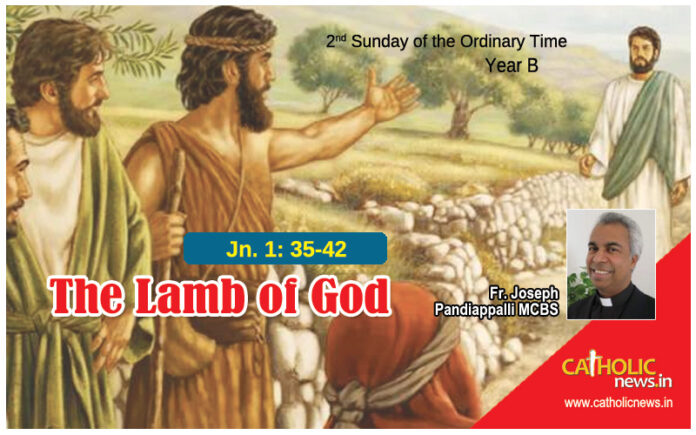
We read in today’s Gospel that John the Baptist addressed Jesus as Lamb of God. As two of the disciples of John the Baptist heard it they left John and followed Jesus. Thus John the Baptist fulfilled his mission of preparing the way for Jesus and presenting Jesus to the public. His statement about Jesus, “He must increase, but I must decrease,” is realised in what John the Baptist disappeared from the scene and Jesus continued the ministry and the disciples of John followed Jesus. It shows also that ministry of Jesus and John the Baptist had similarity.
Although Jesus and John the Baptist were contemporaries from the same region with family relations and both of them exercised similar ministry there was no concurrence between them even if the disciples of both Jesus and John could think of such a concurrence. Even after the death of John the Baptist and the resurrection of Jesus there were contacts between the disciples of Jesus and the disciples of John the Baptist. It might be possible that gradually many of the disciples of John became the disciples of Jesus. That means there was the movement of John the Baptist and the movement of Jesus which gradually merged into a single movement of Jesus.
Addressing Jesus as Lamb of God is typical for Jesus in the context of the mission and ministry of Jesus. Lamp does not symbolise power and strength. It symbolises weakness, love and trust. Jesus never exercised power on other human beings. He never showed his strength on earth. He exercised power over evil and over sin. He showed strength against the evil spirit. The symbol the Lamb of God shows the self offering of Jesus for the salvation of humanity.
As Andreas and another disciple of John the Baptist whose name is not known, wanted to follow Jesus Andreas asked where Jesus lived. Jesus let them to come to him and personally see and experience. This personal encounter and experience helped them to recognise Jesus and motivated them to become the disciples of Jesus. The decision to follow Jesus made Andreas a missionary. First he motivated his own brother Simon to follow Jesus.
In following Jesus the importance of personal encounter with him and personal experience of Jesus is underlined in this pericope of the Gospels. The words of Andreas, “We have found the Messiah”, expressed the depth of the personal encounter and the personal experience of Andreas. It testified that Andreas lived in the expectation of Messiah and had the faith and knowledge of the Old Testament traditions.
Just as the encounter of Andreas with Jesus made him the disciple of Jesus within a short time and he recognised Jesus as Messiah and started to find people to follow Jesus, Jesus recognised and called Simon at first sight. Jesus said: “So you are Simon the son of John? You shall be called Cephas” which means Peter. This name Peter given by Jesus became the official name of Simon and it constituted the mission and ministry of Simon namely the role of Peter for the community of Jesus not only during the life time of Jesus, Simon and the other disciples but also for the entire church for the following years up to this day.
Thus John the Baptist addressing Jesus as Lamb of God, two disciples of John leaving him and becoming the disciples of Jesus, they recognising Jesus as Messiah and becoming missionaries of Jesus and Jesus designating Simon by the first sight as Peter namely the leader of the community of Jesus are some of the themes of today Gospel. We are invited to recognise Jesus as Messiah and Son of God and to follow him like Andreas and Simon and become His disciples and missionaries. Let us forget our past in following Jesus and becoming his disciples, and orient towards the future. Let the Spirit guide us.
Fr. Joseph Pandiappallil MCBS



